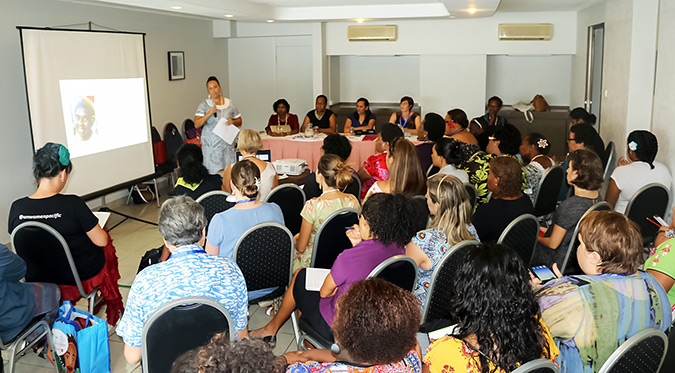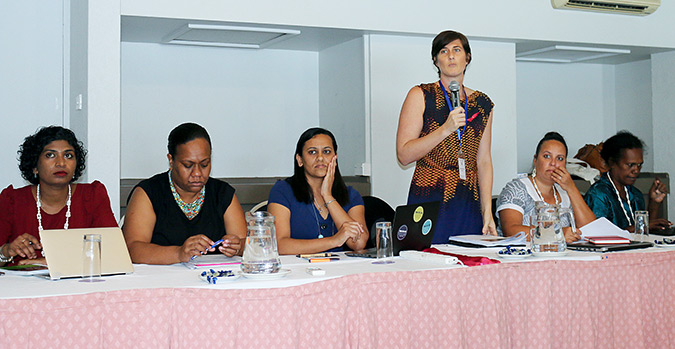Addressing Violence Against Women Essential to Economic Empowerment
Date:
Fiji and Pacific Islands — “Violence against women (VAW) is a significant economic issue which carries high costs to individuals, households, the public sector, businesses and society,” said Abby Erikson, Programme Manager of UN Women Fiji Multi-Country Office’s (MCO) Ending Violence Against Women (EVAW) programme.

“However, we cannot lose sight of VAW as a violation of human rights - women have a right to live a life free from violence, beyond any economic justification for it,” added Ms Erikson.
Panelists - including UN Women, the Pacific Community’s (SPC) Regional Rights Resource Team (RRRT), Pacific Women Support Unit, Fiji Women’s Rights Movement (FWRM) and International Finance Corporation (IFC) – highlighted the connection between VAW and Women’s Economic Empowerment (WEE) at the Triennial Conference of Pacific Women being held in Suva, Fiji, from 2-6 October 2017.
The Pacific region has some of the highest rates of VAW in the world, where two out of three women reported experiencing physical or sexual violence by a partner – double the global average.
Tara Chetty, Senior Programme Officer (Gender) for the Pacific Women Support Unit presented research findings from the Solomon Islands and Papua New Guinea (PNG) led by the Australian National University in partnership with the International Women’s Development Agency (IWDA) entitled “Do No Harm – Understanding the Relationship between Women’s Economic Empowerment and Violence against Women in Melanesia.”
“Some of the WEE initiatives added to the tensions and conflicts that already existed around men’s financial control of the household, with men using the money for purposes such as alcohol that didn’t benefit the household,” said Ms Chetty.

“The design of WEE must address gender norms and power relationships in the household, otherwise we add to women’s workloads while putting women more at risk of violence,” added Ms Chetty.
There is a direct relationship between women’s access to income and an increase in violence and control – which hinders WEE and significantly impedes women’s ability to fulfil their potential – including education and employment opportunities, income earning capability and advancement in the workplace.
“According to the Asian Development Bank Country Gender Assessment for Fiji (2015), the estimated annual cost of intimate partner violence is 7 percent of Gross Domestic Product (GDP). This is due to higher turnover in the workplace, lower individual work performance, increased health expenses and absenteeism or human resources costs”, said Shabina Khan, UN Women EVAW Project Coordinator for Fiji and Kiribati.
However, earning an income or owning an asset can also reduce economic stress for women, increase their bargaining power in the household and give them the means to prevent or escape abusive relationships.
More needs to be done to advance government legislation, policies and national action plans on EVAW as well as remove legislative and policy barriers that prevent or impede women from having access to and control over savings and assets.
Neomai Maravuakula, Senior Human Rights Advisor with RRRT said “while legislation that criminalises domestic violence have been adopted in most Pacific Island Countries (PICs) in recent years, the current family law legislation in many countries still limits women’s control over property and resources."
Ms Maravuakula said “women can also have difficulty accessing services and protections under Family Protection legislation, partly due to not having the money to be able to travel to access the services or pay the application fees for legal protections.”
“Various aspects of Family Law including maintenance and custody legislation may make it difficult for women to keep the custody of their children. In addition, financial support that is provided through maintenance may provide women with additional assistance that they need to take care of their children,” added Ms Maravuakula.
Employment legislation is outdated in many PICs and often does not include sexual harassment - or if the employment legislation exists, there are no procedures or mechanisms to address issues such as sexual harassment or employees are unaware of the protection provided for under the legislation.
According to the Fiji Women’s Rights Movement (FWRM) sexual harassment research project in Fiji, 20 percent of women had experienced sexual harassment in the workplace and most had not reported the sexual harassment, either due to fear, lack of awareness of policies or absence of policies in the workplace.
“Of those harassed, 81 percent of the women said it happened during normal working hours, with food service having the highest rates of employees experiencing sexual harassment at 36 percent,” said Menka Goundan, Team Leader Gender and Transitional Justice with FWRM.
Key recommendations from the session, including improved workplace policies around sexual harassment, removing legislative barriers to WEE in outdated family law and ensuring WEE programmes also address gender and social norms, were submitted in a collective outcomes document for consideration during the 6th Meeting of Ministers for Women.
Women’s economic empowerment is the theme of the 13th Triennial Conference of Pacific Women and the 6th Meeting of Ministers for Women, primarily coordinated by ‘conference secretariat’ the Pacific Community (SPC), in collaboration with the multi-partner ‘steering committee’, and principally supported by the Australian Government.
UN Women’s Ending Violence against Women and Girls (EVAWG) Programme aims to help women and girls live a life free from violence. It is designed around international and Pacific evidence that promotes a holistic approach; empowering women and men to break the cycle of violence, while also strengthening capacity among duty bearers to manage the associated social and economic costs.
Media enquiries should be directed to:
Terri O’Quinn
Humanitarian Communications Officer
UN Women MCO Fiji
Ph: +679 330 1178 ext. 108
Email: [ Click to reveal ]
BACKGROUND INFORMATION
UN Women Ending Violence Against Women (EVAW) programme
UN Women’s Ending Violence against Women and Girls (EVAWG) Programme aims to help women and girls live a life free from violence. It is designed around international and Pacific evidence that promotes a holistic approach; empowering women and men to break the cycle of violence, while also strengthening capacity among duty bearers to manage the associated social and economic costs. The EVAW programme has three main components including adopting and implementing laws and policies that address violence against women, and the overall gender discrimination and inequality that impedes women from leaving an abusive relationship; addressing the root causes of violence against women, as well as the social norms, practices and behaviours that tolerate and condone the violence, in order to prevent it occurring in the first place; and enhancing access of survivors to essential services to address their immediate needs and prevent violence from re-occurring.
UN Women’s Markets for Change (M4C) project
UN Women’s Markets for Change (M4C) project is a key component of its Women’s Economic Empowerment programme. M4C is a six-year, multi-country initiative that aims to ensure marketplaces in rural and urban areas of Fiji, Solomon Islands and Vanuatu are safe, inclusive and non-discriminatory, promoting gender equality and women’s empowerment. A UN Women project, Markets for Change is principally funded by the Australian Government.
UN Women Multi-Country Office (MCO) in Fiji
The United Nations Entity for Gender Equality and the Empowerment of Women (UN Women) was created at the July 2010 United Nations General Assembly. A global champion for women and girls, UN Women was established to accelerate progress on meeting their needs worldwide. The MCO covers 14 Pacific Island Countries and Territories (PICTs): Cook Islands, Federated States of Micronesia, Fiji, Kiribati, Nauru, Niue, Palau, Republic of Marshall Islands, Samoa, Solomon Islands, Tokelau, Tonga, Tuvalu and Vanuatu. The MCO works to progress gender equality and women’s empowerment in the Pacific through four key programmes: Women’s Economic Empowerment; Ending Violence Against Women; Political Participation, Leadership and Human Rights; and Gender and Protection in Humanitarian Action.
For further information please visit:
http://fiji.unwomen.org
http://www.facebook.com/unwomenpacific
http://www.twitter.com/unwomenpacific